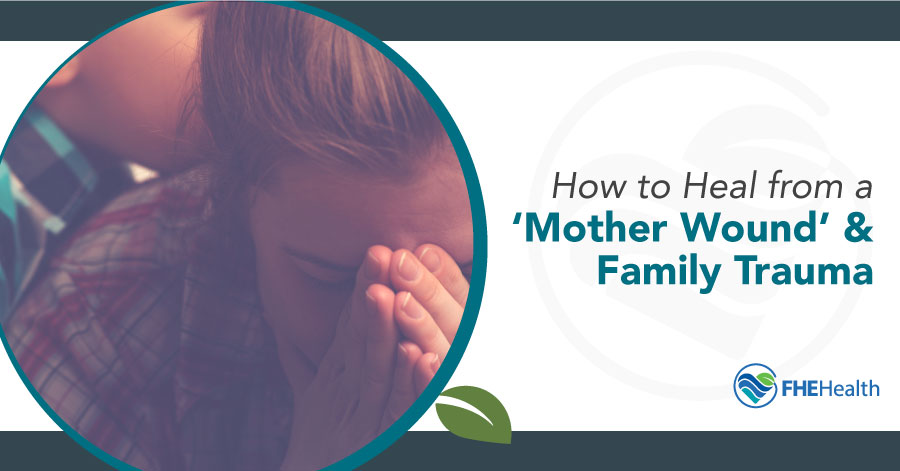
“A mother is always the beginning. She is how things begin.”
— Amy Tan, The Bonesetter’s Daughter
The term “mother wound” might not be immediately familiar in daily life, but there’s a good chance you’ve encountered the phenomenon both depicted in fiction and reflected in reality.
One of the most famous novelists to craft stories around this theme is Amy Tan. In her bestseller The Bonesetter’s Daughter, Ruth discovers that her mother is showing signs of dementia. Ruth and her mother, LuLing, had a contentious relationship in her childhood and often clashed. Although adult Ruth has a relatively stable career as a ghostwriter, she struggles with feelings of sadness and resentment toward her mother. She also has general feelings of being overwhelmed by the emotional demands of family life and relationships.
As Ruth learns more about her mother’s life, she begins a journey toward healing, acceptance, and a degree of forgiveness. What Ruth is dealing with is called the mother wound, and it’s far more than just a fictitious problem.
A mother wound is a very real trauma that many people spend their adult lives coping with, although they don’t always recognize its source. It isn’t necessarily connected to outright abuse, although it can be. However, it signals a deficiency in a person’s relationship with their mother that can negatively impact their self-worth and relationships. The effects of this damage can be widespread, and it’s worth addressing to enjoy better mental health and more stable relationships.
What Is a Mother Wound?
A mother wound isn’t a specific clinical diagnosis. Rather, it describes a cluster of maternal abandonment effects that derive from “under-mothering.” Much of a child’s sense of self derives from their relationship with their mother. Having an emotionally absent mother can lead to mental health and relationship struggles in later life.
Being a non-nurturing mother can mean many things. Some examples are mothers who:
- Supported their children’s physical needs but didn’t offer security, care, and love
- Lacked the empathy to help their children navigate and identify their feelings
- Forbade their children from expressing negative emotions
- Were hypercritical and/or extremely demanding
- Needed the child’s support with their own emotional needs to the extent that the child was effectively the caregiver
- Left their children unsure that they were loved or even liked, or that they could turn to their mother in times of need
There are various reasons why under-mothering can occur. Some women simply can’t cope with the societal expectation of mothers as hyper-nurturing superhumans. Mothers who’ve experienced abuse or trauma themselves and haven’t processed that trauma may be unable to love and nurture others. Alcoholism or drug addiction can also be factors.
Potential Damage Caused by a Mother Wound
A mother wound can cause different kinds of damage. Among them are low self-esteem, struggles with emotional awareness and self-soothing and difficulties forming relationships.
Self-esteem is fundamentally rooted in having experienced the kind of secure attachment that makes a child feel like they matter. Without this, a person can struggle with persistent feelings of unworthiness. This can make it harder to maintain boundaries, take risks or commit to personal growth and achievement. A constant fear of disapproval can lead to an obsession with “not rocking the boat” or taking up others’ time.
Struggles with emotional awareness can leave a person unable to cope with negative feelings like anger or hurt other than denying and suppressing them. An inability to manage feelings can cause a person to look outward for comfort. This, in turn, can lead to addiction and substance abuse disorders.
Additionally, without the foundation of a trusting relationship with their mother, an individual can have problems trusting other people. This presents obvious difficulties in forming friendships and romantic relationships, which are based on trust.
How to Know if You Have a Mother Wound
Because a mother wound isn’t a specific diagnosis, there isn’t a defined set of symptoms to look for. However, there are a number of common signs that can indicate unresolved issues with under-mothering:
- Persistently feeling there’s something wrong with you, or never having had your mother’s approval or acceptance
- Concerns about being unloved by your mother or loved less than other family members
- Struggling to relate with your mother on an emotional level
- Fear that the slightest imperfection, mistake or accident could sabotage your connection with or affection from your mother
All of these can take a long-term toll on self-esteem and lead to the kinds of damage described above. Fortunately, it’s possible to address the effects of under-mothering.
How to Address and Heal From a Mother Wound
The key steps in addressing a mother wound are:
- Expressing the pain. The first step in healing from trauma is recognizing that it’s there.
- Loving yourself and practicing self-care. It’s important to recognize that under-mothering isn’t the fault of the child. This makes it possible to let go of negative self-images that stem from it. It also allows for self-care in little ways that before may have felt self-indulgent.
- Getting in touch with your emotions. Being able to stop, feel what you’re feeling and name the feeling is important to develop self-awareness.
- Finding forgiveness. Breaking through the rage felt by your child self is vital for healing. With a clear adult perspective, it can become easier to see the struggles that led to under-mothering. This makes it possible to forgive those hardships and let go of resentment.
Therapy plays a crucial role in addressing a mother wound. It provides a safe environment in which to explore your inner child’s feelings of being unwanted, unloved or ignored. It helps create a positive emotional and mental picture of your present life. Finally, it provides guidance in setting healthy boundaries with your mother, which can allow your relationship to grow in more positive ways.






